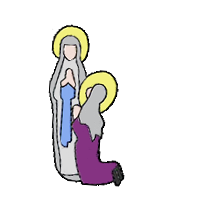HISTORY
‘A people without the knowledge of their past history, origin and culture is like a tree without roots’ Marcus Garvey
At St. Bernadette’s, our History curriculum is designed to provide pupils with opportunities to ask questions, think critically, weigh evidence, sift arguments and develop perspective and judgement, to understand the complexity of people’s lives, the process of change, the diversity of societies and relationships between different groups, as well as their own identity and the challenges of their time. Through history, we aim to foster the children’s interest and understanding about the life of people who lived in the past. We aim for the children to develop a sense of identity - our history curriculum represents the ever-increasing diverse nature of our school and celebrates the historical heritage of our children and families.
As with all our subjects, our subject design interrelates different strands of knowledge:
Substantive knowledge represents the historical content that is taught in each year group. In planning, this knowledge is the content we want pupils to know and remember including topic specific vocabulary. In selecting the specific content, we ensure that the historical heritage of our children is studied. Themes are explored in each year group through different historical periods. By highlighting these themes, we are able to ensure that connections are made so that children can easily activate prior knowledge and begin to develop familiarity and confidence, which then supports their future learning within the subject. In history, our themes include:
- Beliefs
- Lifestyle
- Geographical significance
- Trade and Commerce
- Hierarchy & Power
The methods or conceptual frameworks used by historians are represented in our curriculum by the following areas:
- Significance: Understanding the importance assigned to aspects of the past (and exploring aspects worthy of study)
- Evidence: Information gathered from historical sources
- Similarity and difference: Understanding the extent of similarity and difference between different sorts of people – and between people within the same group
- Continuity and change: Understanding that some things change and some things stay the same
- Cause and consequence: Understanding a chain of events and developments
- Interpretations: Understanding how and why interpretations of the past can differ
Disciplinary knowledge represents the skills of a historian. This knowledge is drawn from the National Curriculum Programmes of Study and is organised into categories of knowledge and mapped in a vertically integrated progression which ensures opportunities for pupils to build, revisit and deepen their knowledge and understanding.
Assessment in History is more than just knowing facts and dates. We assess the pupil’s ability to apply their knowledge through our clearly defined outcomes at the end of each unit of learning. This provides information on the children’s ability to use and apply new knowledge in a subject specific context.
